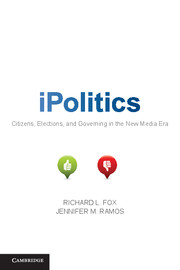Crossref Citations
This Book has been
cited by the following publications. This list is generated based on data provided by Crossref.
Hague, Rod
and
Harrop, Martin
2010.
Comparative Government and Politics.
p.
111.
Baum, Matthew A.
2011.
Red State, Blue State, Flu State: Media Self-Selection and Partisan Gaps in Swine Flu Vaccinations.
Journal of Health Politics, Policy and Law,
Vol. 36,
Issue. 6,
p.
1021.
Kavanaugh, Andrea L.
Sheetz, Steven D.
Sandoval-Almazan, Rodrigo
Tedesco, John C.
and
Fox, Edward A.
2014.
Media use during conflicts.
p.
205.
Daoust, Jean-François
2017.
Démocratisation de l’information : effets différenciés des médias traditionnels et des nouveaux médias1.
Politique et Sociétés,
Vol. 36,
Issue. 1,
p.
25.
2017.
La communication politique.
p.
247.
Sandoval-Almazan, Rodrigo
2017.
Politics, Protest, and Empowerment in Digital Spaces.
p.
72.
Daoust, Jean-François
and
Sullivan, Katherine V.R.
2017.
Campaign-Specific Information and Media Effects.
Canadian Journal of Communication,
Vol. 42,
Issue. 4,
p.
669.
Sandoval-Almazan, Rodrigo
and
Lopez, Juan Carlos Montes de Oca
2019.
Citizen Engagement and Social Media.
International Journal of E-Politics,
Vol. 10,
Issue. 2,
p.
24.
Sandoval-Almazan, Rodrigo
2019.
Civic Engagement and Politics.
p.
1203.
Cárdenas, Juan David
2021.
El plebiscito del 2016 en Colombia: Framing, resonancia cultural y comunicación política en los contenidos visuales de Facebook.
Ciencia Política,
Vol. 16,
Issue. 31,
p.
235.
Sandoval-Almazan, Rodrigo
and
Lopez, Juan Carlos Montes de Oca
2022.
Research Anthology on Citizen Engagement and Activism for Social Change.
p.
945.



